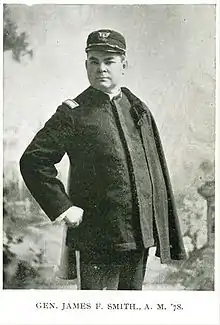James Francis Smith | |
|---|---|
 | |
| Associate Judge of the United States Court of Customs Appeals | |
| In office March 30, 1910 – June 29, 1928 | |
| Appointed by | William Howard Taft |
| Preceded by | Seat established by 36 Stat. 11 |
| Succeeded by | Finis J. Garrett |
| Governor-General of the Philippines | |
| In office September 20, 1906 – November 11, 1909 | |
| President | Theodore Roosevelt William Howard Taft |
| Preceded by | Henry Clay Ide |
| Succeeded by | William Cameron Forbes |
| 4th Associate Justice of the Supreme Court of the Philippines | |
| In office June 17, 1901 – February 17, 1903 | |
| Appointed by | William McKinley |
| Preceded by | Seat established |
| Succeeded by | John T. McDonough |
| Personal details | |
| Born | James Francis Smith January 28, 1859 San Francisco, California |
| Died | June 29, 1928 (aged 69) Washington, D.C. |
| Education | Santa Clara University (B.S., B.A., M.A.) University of California, Hastings College of the Law |
James Francis Smith (January 28, 1859 – June 29, 1928) was an associate justice of the Supreme Court of the Philippines, Governor-General of the Philippines and an associate judge of the United States Court of Customs Appeals.
Education and career
Born on January 28, 1859, in San Francisco, California,[1] Smith received a Bachelor of Science degree in 1877 from Santa Clara University and received a Bachelor of Arts degree and Master of Arts degree in 1878 from the same institution, then attended the University of California, Hastings College of the Law.[1] He entered private practice in California from 1881 to 1898.[1]
In 1898, Smith joined the United States Army and served in the Philippine–American War, where he served as the Collector of Customs for the Philippine Archipelago in Manila.[1] Following the end of the war, Smith held a number of offices on the Philippine Commission, including Secretary of Public Instruction and Vice-Governor. From 1901 to 1903 he was an Associate Justice of the Supreme Court of the Philippines.[1] He was Governor-General of the Philippines from 1906 to 1909.[1]
Smith's tenure as Governor-General saw the Philippines achieving greater territorial autonomy as and allowing for greater Filipino representation in the government. On March 28, 1907, Smith issued a statement claiming that the people of the Philippines had largely been "law-abiding, peaceful, and loyal to the United States" according to a 1905 census.[2] He was present at the inauguration of the first Philippine Assembly on October 17, 1907, after the Philippines had held its first democratic elections.
.jpeg.webp)
In 1908, after the construction of a mansion in Baguio that would serve as the colonial government seat during summertime, Smith's family became the first residents of the building, with his wife wanting to escape the heat of Manila.[3]
Federal judicial service
Smith was nominated by President William Howard Taft on March 9, 1910, to the United States Court of Customs Appeals (later the United States Court of Customs and Patent Appeals), to a new Associate Judge seat authorized by 36 Stat. 11.[1] He was confirmed by the United States Senate on March 30, 1910, and received his commission the same day.[1] His service terminated on June 29, 1928, due to his death in Washington, D.C.[1]
Membership
Smith was a member of the Native Sons of the Golden West, Alcatraz Parlor No. 145.[4]
Bibliography
- A brief history of the United States Court of Customs and Patent Appeals by Giles S. Rich. Washington, D.C. : Published by authorization of Committee on the Bicentennial of Independence and the Constitution of the Judicial Conference of the United States : U.S. G.P.O., 1980.
References
- 1 2 3 4 5 6 7 8 9 "Smith, James Francis - Federal Judicial Center". www.fjc.gov.
- ↑ "March 28, 1907, Governor Smith declared that Filipinos are peaceful and loyal to the US". The Kahimyang Project. 2014-03-04. Retrieved 2023-10-16.
- ↑ "Mansion House - Presidential Museum and Library". Malacañan Palace. GOV.PH. Archived from the original on 21 October 2018. Retrieved 8 September 2018.
- ↑ Proceedings of the 22nd Annual Session of the Native Sons of the Golden West, 1899
Sources
- "Smith, James Francis - Federal Judicial Center". www.fjc.gov.
.svg.png.webp)